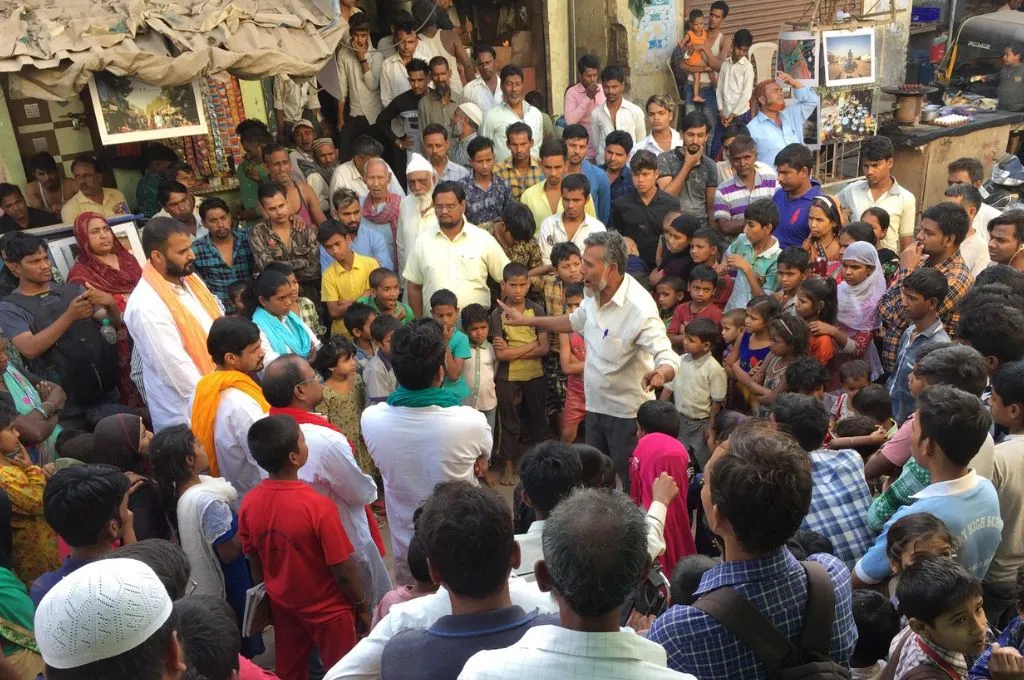Hailing from Rajasthan’s Rajsamand district, Shankar Singh is a social and political activist, musician, lyricist, theatre artist, and storyteller. He co-founded the Mazdoor Kisan Shakti Sangathan (MKSS) alongside prominent activists Aruna Roy and Nikhil Dey. MKSS is known for its role in advocating for and implementing the Right to Information Act (RTI) in the country.
Shankar Singh has employed a variety of creative strategies to champion the rights of marginalised labourers and farmers, focusing on issues such as wages, employment, and other government social entitlements. His approach is marked by a unique blend of entertainment, music, and sharp wit and satire. He has led many successful movements and campaigns, both at the grassroots and national level. Notably, he has contributed to the implementation of landmark schemes like MGNREGA and government processes such as social audits.
In this conversation with IDR, which is the second of two episodes, Shankar Singh talks about using different mediums—folk music, drama, and puppetry—to engage with communities during social movements. He also discusses what those with specialised skills have to offer to grassroots nonprofits and offers valuable perspectives on carrying on in the face of disappointment and fatigue.
Here are some highlights from the conversation:
00.16 | On working with different mediums
I got the chance to see puppets at one place, the Literacy House in Lucknow, so I started following these people. I felt that I had to learn this and asked them to teach me how to use puppets. Whenever I got the chance, I’d go to them. There was a workshop there, after joining the nonprofit. I went to that workshop. But in the same campus there was a department of puppetry that did only this work. I showed a lot of curiosity in it. I thought that I definitely wanted to acquire this skill. Then I learned puppetry from there. I assimilated puppetry into my thought and then expressed myself through it.
I felt that these mediums are very strong, be it drama, songs, stories, or puppetry. I completely assimilated these mediums while working with that nonprofit.
[During L K Advani’s Rath Yatra,] we thought about what we should do. We made a beautiful chariot out of a cart that we got from the vegetable market, placed big horses made of cloth in front of it, and wrote ‘Ghotala Rath Yatra’ on it. We put placards around an umbrella. These placards bore the names of all the ghotalas(scams) that had taken place. And a chair was placed on the cart for the leader to sit on. The chariot was covered with saffron decorations. We did all this behind the tent, and the police did not know that we were doing something. And I announced on the mike, “Tomorrow at 5 o’clock in the evening, a Rath Yatra will start from here. And the leader of our Rath, his name is Rajvani, he will come from Delhi. He will be riding on the chariot and there will be a Rath Yatra.”
The next day we took out the chariot from there. And I was on top of the cart as a leader. I was dressed such that all the parties were included. The Congress cap and saffron-coloured gamchha (scarf). And the leader sat on a chair on the stage. There was a ghotala umbrella, and on the front it said ‘Ghotala Rath Yatra’. It also said Rajvani. And he came out. And there was also singing, “Ghotala raj ki jai jai bolo, jai-jai bolo, jai-jai bolo. Bhrashtachaar karo, hari hari bolo.” (Praise the reign of scams. Do corruption and take the lord’s name.) “Arey hawala ka halwa chaat chaat khaya.” (We really enjoyed the black money pudding.)
Whatever scams happened like this, we kept talking about them in songs.
08.11 | On how people with specialised can collaborate with those working on the ground
Let me give you an example. When this person called Vineet came to us, he said that we can see the Jan Soochna Portal. But how do we show it in the village? For this, he took a projector. Placing his small projector on a white wall, he brought out the Jan Soochna Portal. Then he called over some children, who thought they were being shown a film. So first he played a small film, some seven to 10 minutes long. He showed something related to RTI. The children saw it, enjoyed it. Then he asked one child to bring his ration card. He entered the ration card number in the portal. Vineet then displayed it on the wall, and when he did that the child could see a photo, which was of his father. He said, “Oye, this is my father’s photo,” and was quite amazed. Then Vineet said, look, I will show you all the times you took wheat. When he accessed the information on the portal, he said that the child’s family had taken 80 kg last month.
The child ran home, called his father and brought him back, saying, “They’re saying that you took 80 kg. The film in the projector is saying it.” The father said, “It was not 80 kg, we got 40 kg.” “But they’re saying something else.” The father came and asked to look. Then he saw that it said 80 kg. “Sir, it is not 80 kg. We took 40 kg.” “But here it says 80 kg.” “But I am telling you that I took 40 kg. We have never got 80 kg, we have got 40 kg every time. Every alternate month.”
He went to the dealer, who is from the village, and said, “Look at this, I have got 80 kg on paper and you gave me only 40 kg.” The dealer asked him where he had got this information from, and told him to take the rest of his wheat but not make any noise.
Soon, people queued up before Vineet asking for their ration information, and Vineet kept giving them this information. There was a line outside the ration [shop].
12.30 | On incidents that have left a lasting impact
There is an old couple in the village, they don’t have children. They don’t even have a house; they live under this shed. So I have helped them in getting pension. Sometimes they’re not able to get the ration food, so there are fights with the dealer on why they have not been given it. Sometimes he gives it and sometimes he doesn’t. I could not go for two to three months. Vineet and I both could not go, so they reprimanded us with great authority, that you did not come. I just asked them how things were going. “Okay,” they said.
When I lifted the lid of the drum, I saw that there was nothing in it. And there were no other things either. I asked, “Is there no atta (flour)?” “No, it has been five days. There has been nothing.” “There has been nothing for five days?”
Vineet went to bring her wheat and I was sitting near the old woman. She asked me to write down my mobile number on the wall somewhere. “I don’t have a phone but if someone comes I will tell them to talk to you.” I came [back] after writing [the number]. That day I felt very sad. And the next day I get a call that the old lady has passed away. We had brought that wheat. Even that wheat was of no use.
When we arrived [at the cremation,] there were some very big things being said there. Spiritual conversations. I mentioned that I have met this family, and said that this death happened due to hunger. Then this person asked how. I said I had visited them and there was no food in that house for five days. I said that I had bought the bag of wheat from the ration shop yesterday, and it was not even useful.
17.36 | On maintaining his passion for social change
While doing this work, many times you feel tired and disappointed. It definitely happens. It happens in my mind too. Whenever I have felt that I am in a lot of conflict and trouble, or if I am not sure about what I am doing and feeling stuck, that day I go to some poor person’s house. You sit there for an hour or two, you will understand their whole economics, and you will think, how can I stop? What is the condition of the family I have met? And what about me? I am much better off. I start thinking, personally, I don’t have any problem at all. I would not be doing any good if I withdrew myself. One’s enthusiasm doubles. And there is a lot of strength [in being around] a poor person, who has nothing but darkness all around, how will he survive in his life? Strength is found there. In this area, we know the houses, the families [that are struggling]. A friendship is formed whenever you go and talk to them. They also come to us, and together we try to find solutions. And then I don’t feel any physical fatigue, and my enthusiasm comes back.
Read the full transcript here.
—






